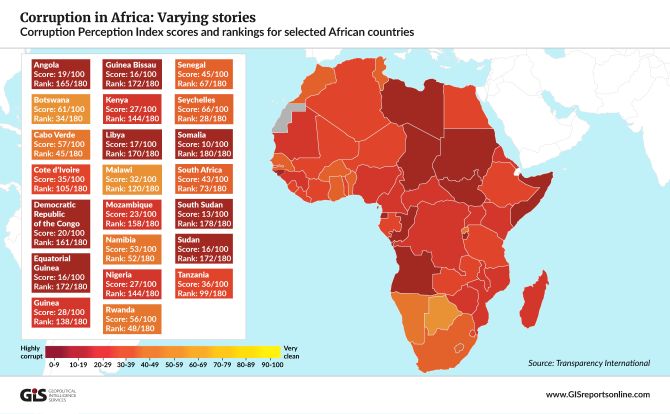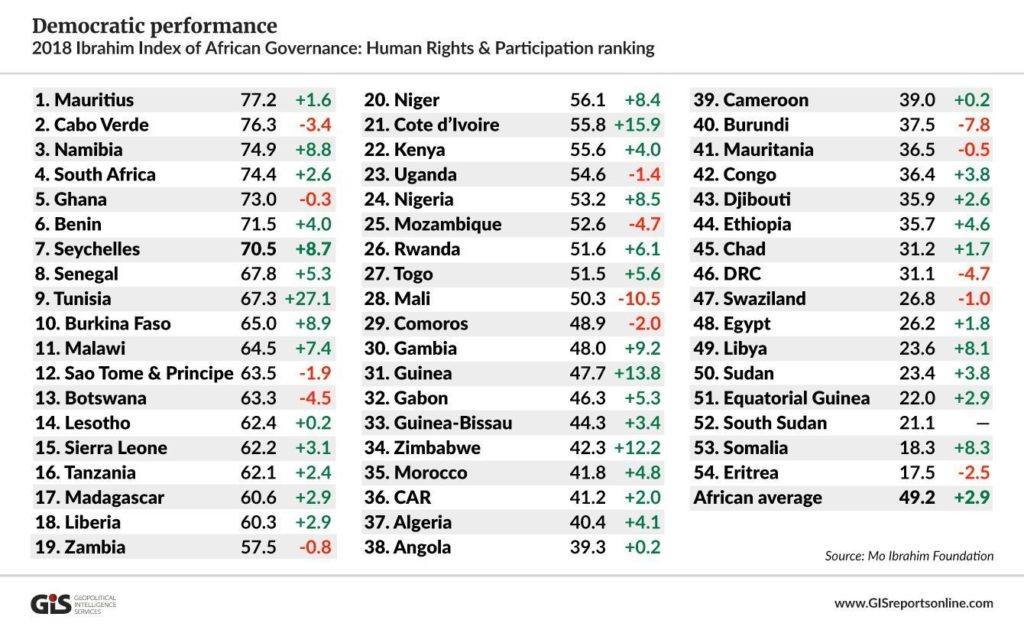Africa’s citizens demand democracy but do not think they are getting it, observers suggest. Afrobarometer [a partner of the National Endowment for Democracy] describes this sub-category as “dissatisfied democrats.”

According to Transparency International’s 2018 Corruption Perceptions Index (CPI), sub-Saharan Africa remains the world’s most corrupt region, analyst Teresa Nogueira Pinto writes for Geopolitical Intelligence Services:
- The picture is not homogeneous, however: while corruption continues to hamper growth in some big African economies, like Nigeria, South Africa and Kenya, countries like Botswana, Seychelles, Cabo Verde, Rwanda and Namibia perform better than OECD countries such as Italy or Greece…..
- Two African countries – Senegal and Cote d’Ivoire – are among the 20 “improvers” singled out by the 2018 CP. According to the African Development Bank’s 2019 African Economic Outlook, these countries are also expected to be among the continent’s fastest-growing economies in 2019 (with growth rates of 7 and 7.4 percent respectively). In both cases, growth has been driven by political stability, macroeconomic reforms and business-friendly policies.
Ahead of the 2019 provincial and national elections, South African voters are preoccupied with the biggest scandals to hit democratic South Africa – Corruption and State Capture, SABC reports (above).
In Ethiopia, Africa’s second-most-populous country, a liberalizing prime minister has freed political prisoners and loosened years of constraints, the Times adds.
In their preliminary report on Nigeria’s elections, the International Republican Institute (IRI) and National Democratic Institute (NDI) regret the lack of progress in election administration and conduct of political parties.
 he African Centre for Leadership, Strategy & Development (LSD) said the low turnout of voters during the governorship and house of assembly elections was an indication that the citizens were losing faith in the democratic process.
he African Centre for Leadership, Strategy & Development (LSD) said the low turnout of voters during the governorship and house of assembly elections was an indication that the citizens were losing faith in the democratic process.
NDI and IRI recommend that civil society should:
- Convene national and state-level multi-stakeholder dialogues to draw lessons from the 2019 election process and galvanize broad-based public support for electoral reform.
- Drawing upon lessons learned from the #NotTooYoungToRun campaign and the passage of the Discrimination Against Persons with Disabilities (Prohibition) Act, create a broad-based coalition and aggressively champion coordinated advocacy efforts to increase the political participation of women.
- Enhance efforts to channel citizen priorities at the state and local level to elected representatives and state-level party structures in an effort to promote more responsive and accountable governance.








